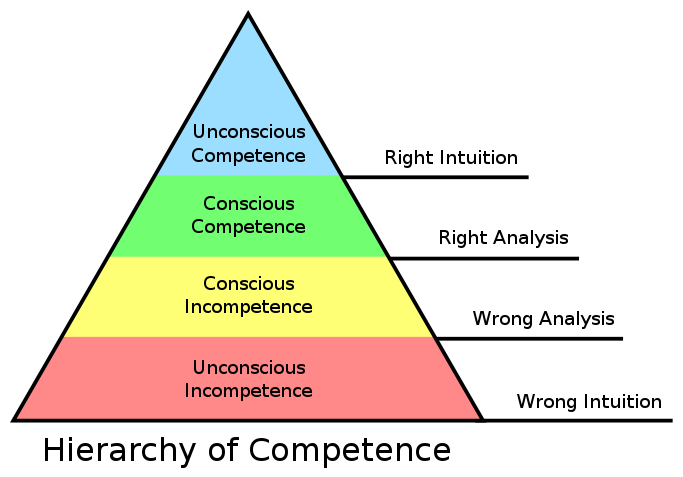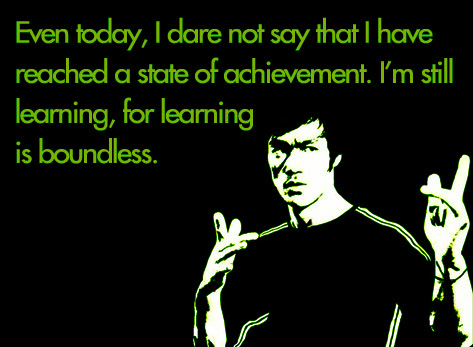Ever heard the phrase “A little knowledge is a dangerous thing?”.
Well it’s true and it’s just as true in the physical development of athletes as it is in any other field.
If you are anything like me, you probably went through a period in your teenage years where you knew everything, you had all the answers and enough confidence to make you incredibly arrogant. After a while, the world slapped you in the face enough to make you realise that actually maybe you do have a few things to learn!
This thought process is actually what is termed the “Four stages of competence” or “Four stages of learning.” This process is entirely applicable to both athletes developing physical skills, as well as coaches developing their coaching methods.

Stage 1: Unconscious Incompetence.
“Who can know all his errors?” – Psalm 19:12
Unconscious incompetence simply means that the athlete/coach lacks the desired skill, but crucially – also lacks the realisation that they don’t have this skill! They may deny the usefulness of the skill, or be caught up in dogma or one specific methodology. This might be displayed as thinking or communicating, “This is the only way to get stronger/faster/fitter/better.” At this point in their journey – they don’t understand that a gap in their skill or knowledge exists.
Essentially – this is why the role of coaches exists! If athletes had the technical and performance knowledge to compete at a world class level – we would be redundant. However, from a coaches perspective, this is a dangerous area for us, because that skill/information we don’t know – may be the very solution to the problem we are trying to solve.
This is the area where a little bit of knowledge is dangerous – because it is potentially applied:
- to the wrong athlete (eg. beginner instead of expert)
- at the wrong time (eg. in a fatigued state instead of a recovered state)
- in the wrong dose (eg. excessive workloads instead of optimal dose)
The classic example of this is a coach using a high level program from a world class athlete at the latter stages of their career and misapplying it to a youth athlete at the beginning stage of their career.

Stage 2: Conscious Incompetence
This is the stage where you suddenly realise you are missing something, either as an athlete or coach. That light bulb moment when you now understand you are lacking a skill, or a piece of information that could make a large impact on your performance. You realise you are making a mistake for the lack of this skill/information and realise you now need this to improve and progress to the next level. The coach/athlete is now ready to commence learning to acquire this skill/information and understands why it is important!
Stage 3: Conscious Competence
In this stage the learner (athlete or coach) is now able to perform the skill or utilise the knowledge, but it requires intentional focus. You might also have heard this as the “cognitive” stage of practice – that’s because it requires conscious cognitive effort to complete the skill. Sounds a lot like “practice” or “training” right? The skill is able to be completed but it’s potentially unstable and can be improved.
Check out the video below of Charles Barkley and his golf swing. Now Charles was a world class athlete in a different sport, but in this context he hasn’t reached the final stage of competence. Watch and see how he consciously engages in this skill. This is a great example of someone practicing conscious competence (although there’s still plenty of room for the skill to be improved!)
https://www.youtube.com/watch?v=SJWnSEhY3Ys
Stage 4: Unconscious Competence
Once the athlete/coach progresses to the unconscious competence stage, they are able to complete the skill without mental effort, also known as “autonomous”. Ever seen an athlete interviewed after they’ve done something spectacular and they can’t really explain how they did it? They don’t go through each part of the skill step by step, consciously focussing on each part. They just step up and complete the skill because now it’s automatic.
This is often the same in expert coaches, they often just have a sense an athlete isn’t quite right whether they are fatigued or over-trained etc. and step in to adjust the program accordingly. It’s not necessarily a cognitive thought process – they have that right intuition demonstrated in unconscious competence.
Here is a great example of unconscious competence. The free kick from David Beckham from England vs Greece in 2001. The context is highly pressurised, England are losing 2-1 and currently not going to qualify for the World Cup. This level of pressure requires a very stable skill at the level of unconscious competence in order to be completed successfully.
So now we’ve reviewed the 4 stages of competence, it’s worth reflecting on where:
- what stage our athletes are at
- what stage we are at as coaches with our coaching practice
The important thing to note is that actually as coaches, we will cycle through these stages again and again as we master a skill/information (eg. coaching a squat) but realise we lack other skills/information (eg. daily undulating periodization). Actually, we must recognise that we are always in the learner seat and never attain the status of a master. We must constantly ask ourselves, “What don’t I know?”

If you enjoyed this post or found it informative, why not check out more like it on our Facebook page.
Are you a grassroots youth sport coach or PE teacher who wants to improve the athleticism of your athletes?? Check out our Fundamental series athletic development programs here.
